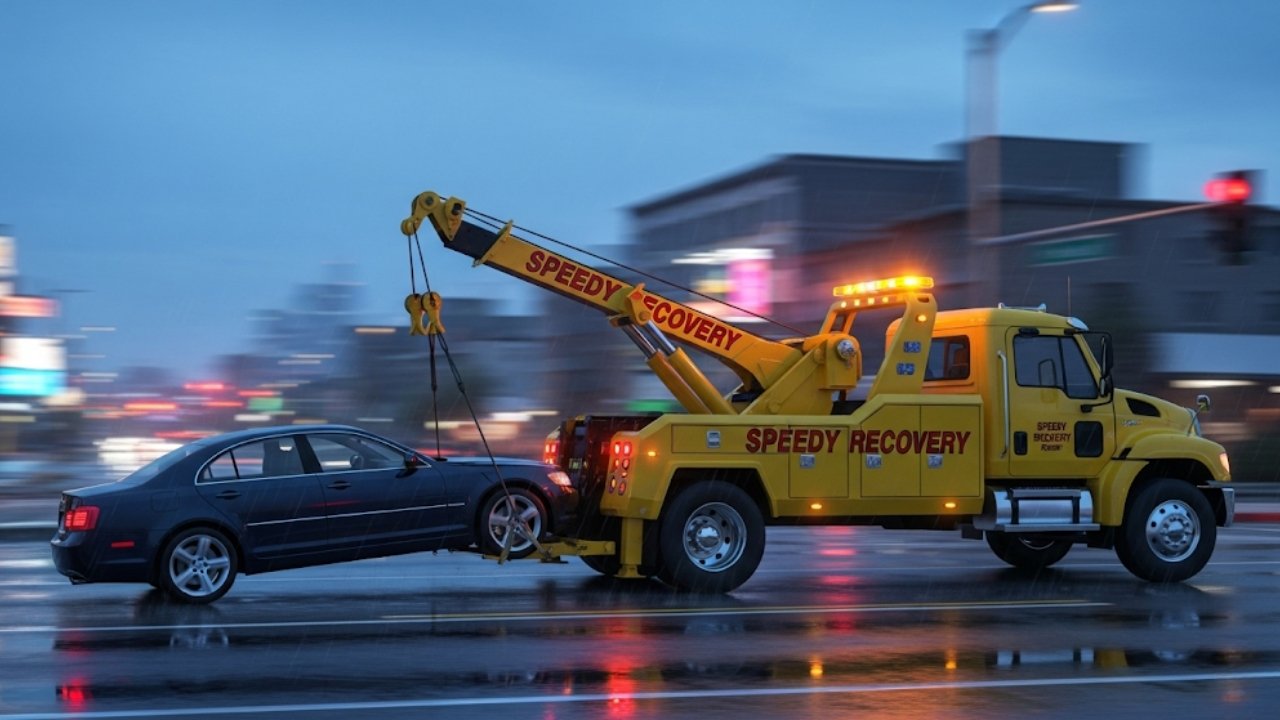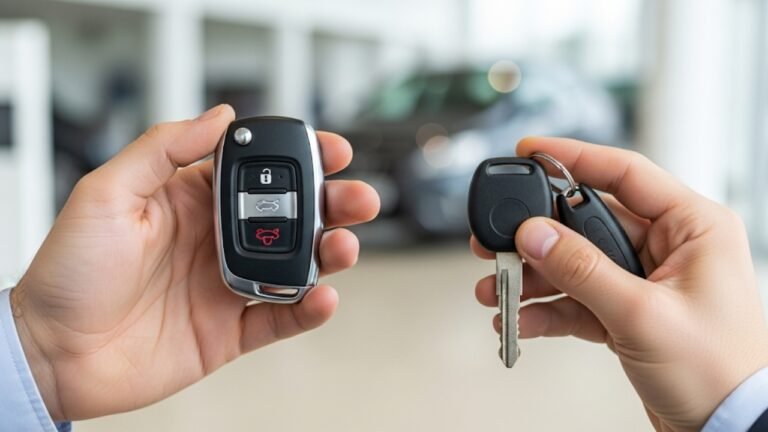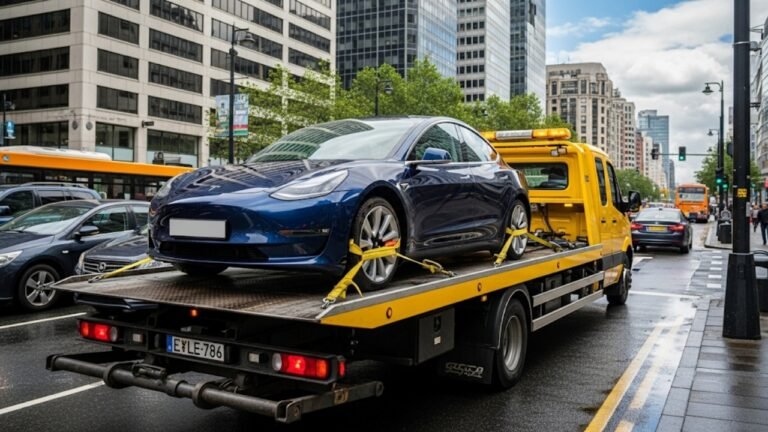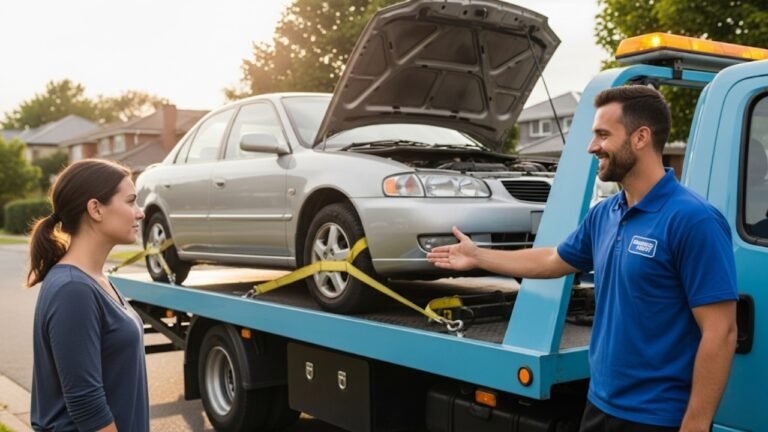How Much Is for Towing a Car?

You’re cruising down the highway. The weather’s perfect, music’s on, and life feels just right. Suddenly—thud-thud-click… clunk!
Your car dies.
Now you’re stranded, phone in hand, Googling: how much is for towing a car?
We’ve all been there or feared that moment. Whether it’s a flat tire, engine trouble, or an accident, car towing can sneak up on you like a plot twist in a thriller. The real shock, though, is often the towing bill.
That’s why knowing what to expect helps you stay cool and save money. In this guide, I’ll walk you through the real towing costs, the variables that change the price, and how you can avoid paying more than you should.
So grab a coffee, sit back, and let’s break this down together.
Understanding the Basics: What Does a Car Tow Actually Include?

Here’s what typical car towing services cover:
-
Hook-up fee (base fee to attach your car)
-
Per-mile rate (cost for every mile your car is towed)
-
Labor and wait time
-
After-hours or emergency fees
-
Storage fees if your car is impounded
Let’s take a closer look.
Imagine you break down 10 miles from home. A towing company may charge:
-
$75 for the hook-up
-
$5 per mile × 10 miles = $50
-
Total: $125
That’s just a standard daytime rate. If it’s 2 AM? Or a holiday? It might double.
Key Insight: Not all tows are created equal. The final price depends on time, distance, location, and your car’s condition.
The Real Deal: How Much Is for Towing a Car on Average?
So, let’s get to the big question—how much is for towing a car really?
| Distance | Average Cost (USD) |
|---|---|
| 5 miles | $50–$85 |
| 10 miles | $75–$125 |
| 20 miles | $95–$150 |
| 50 miles | $150–$275+ |
| 100+ miles | $300–$600+ |
✅ Pro Tip: Most local tows (under 10 miles) are around $75–$125. Long-distance towing (over 100 miles) may cost $500 or more, depending on your state.
But remember, these are averages. Costs in New York City aren’t the same as in rural Texas.
Key Factors That Affect the Cost of Towing a Car
There’s no one-size-fits-all. What you pay depends on a bunch of things—some obvious, some sneaky. Here’s what really impacts the price:
1. Distance of the Tow
This is the biggest cost driver. More miles = more money.
If you’re just off the next exit? Lucky you.
Stranded in the middle of nowhere? Get ready to pay.
2. Type of Vehicle
Not all cars are equal. A compact sedan is easier (and cheaper) to tow than a 4×4 truck, electric vehicle, or luxury car.
-
Motorcycles: Often cheaper ($50–$100)
-
SUVs/Trucks: More complex = more expensive
-
AWD or Electric Vehicles: May require a flatbed tow = higher cost
3. Time of Day and Week
Did your car break down on a Sunday evening or during a snowstorm? Prepare for emergency rates.
Many companies charge 25%–50% extra for:
-
Nights
-
Weekends
-
Holidays
4. Location and Terrain
Towing in a city vs. on a remote hill? Big difference. Urban tows may include traffic or permit fees.
Rural areas often charge more for travel time.
5. Vehicle Condition
If your car’s just sitting there with a flat? Easy.
If it’s stuck in mud, crashed, or won’t go into neutral? You might face:
-
Winching fees
-
Difficult recovery charges
-
Special equipment costs
Hidden Fees You Might Not Expect
Let’s be honest—tow companies can surprise you with hidden fees. That $85 quote? It might jump to $200 after these extras:
-
Fuel surcharges
-
Winching or recovery
-
Storage (if your car sits in their yard)
-
Dollies or flatbed requirement
-
Mileage from their garage to your car (not just from you to the destination)
True Story: A friend of mine once got a quote for $90 but ended up paying $210 because the driver said, “Your wheels locked, needed a flatbed.” Always ask for a full breakdown up front.
How Insurance and Roadside Assistance Can Save You
If you have insurance or a roadside assistance plan, you might not pay anything out of pocket.
✅ What might cover towing?
-
Car Insurance Policies (with roadside assistance add-on)
-
AAA Membership
-
Credit Cards (some premium cards offer this)
-
New Car Warranty Programs
Example Comparison:
| Service | Average Annual Fee | Towing Distance Coverage | Per Use Cost |
|---|---|---|---|
| AAA Basic | $50–$70 | 5–7 miles | Free |
| AAA Plus | $90–$120 | 100 miles | Free |
| Progressive Roadside | $23/year add-on | 15 miles | Free |
| American Express Plat | $695/year | Varies | Often Free |
Quick Tip: Call your insurance provider before you tow. They may arrange a service and foot the bill directly.
DIY Towing: Is It Ever a Good Idea?
If you’ve got a pickup truck, tow straps, and a buddy, you might wonder: “Can I just tow my own car?”
Technically, yes.
But should you? Usually, no.
Here’s why:
-
Most cars today need flatbed towing to avoid damaging the transmission.
-
If you don’t secure it right, you can cause more damage or get a ticket.
-
Your buddy’s truck might not have the torque or braking power to handle it safely.
Unless you’ve got the right gear, training, and permits—leave it to the pros.
What to Do When You Need a Tow (Step-by-Step)
When your car breaks down, stay calm. Here’s a simple plan:
-
Move to a safe location (if possible).
-
Turn on hazard lights.
-
Call roadside assistance or towing company.
-
Ask for an upfront quote (hook-up fee + per mile).
-
Clarify any extras (night fee, flatbed, etc.).
-
Note the driver’s info and towing location.
-
Take pictures of your vehicle (for insurance).
-
Get a receipt.
Smart Move: Save 2–3 local tow numbers in your phone. When disaster hits, you won’t have to search in a panic.
How to Find Affordable Towing Services Without Sacrificing Quality
Let’s be real—no one wants to overpay, especially when you’re already stressed out from a breakdown. The good news? There are ways to find affordable towing services without compromising safety or quality.
Here are a few reliable tips:
Compare Before You Commit
Don’t just call the first towing number that pops up on Google. Use apps or services like:
-
HONK
-
Urgent.ly
-
AAA Mobile
-
Google Reviews or Yelp
These platforms let you compare:
-
Pricing
-
ETA
-
Customer feedback
Pro Tip:
Always ask, “What’s your total fee, including miles, extras, and tax?”
A good company will be transparent. If they dodge the question—run.
Use Simple Language When Calling
Say:
“Hi, I’m broken down at [location]. Can you tell me the total cost to tow my car [number] miles to [destination]?”
Don’t sound unsure—they’ll see an opportunity to upsell you.
Keep Towing Apps on Your Phone
These apps can be lifesavers, especially when you’re out of town or in unfamiliar territory:
-
HONK – No membership needed, nationwide.
-
AAA – Best for consistent quality.
-
Roadside America – Reliable but regional.
Towing Prices by Region: Why Your Zip Code Matters
You might be surprised how much location changes your tow cost. Let’s break it down by region:
| Region | Local Average (Short Tow) | Long-Distance Tow (50+ mi) |
|---|---|---|
| California | $100–$150 | $300–$600+ |
| Texas | $75–$120 | $200–$450 |
| Florida | $80–$135 | $250–$500 |
| Midwest (IL/OH) | $65–$110 | $180–$400 |
| NYC Metro Area | $125–$200 | $400–$700 |
Why such a range?
Cities like Los Angeles or New York often charge more due to:
-
Traffic delays
-
Permit fees
-
High demand
-
Limited parking
In contrast, towing in rural areas might be cheaper per mile but higher for long distances due to travel time.
Quick Story: When I visited Chicago, I had to pay $145 to tow my car only 6 miles—thanks to an unexpected snowstorm surcharge. Weather can definitely affect rates!
FAQs: Honest Answers to the Most Common Questions
1. How much is for towing a car without insurance?
If you don’t have insurance or a roadside plan, expect to pay $75–$125 for local tows, and $250+ for longer distances. Prices vary by region, time, and vehicle type.
2. Is the first few miles of towing free?
Not usually. Some insurance plans or AAA memberships offer a free 5–7 miles, but standard companies will charge from the first mile.
3. Can I refuse a tow and call someone else?
Yes! If a tow truck arrives and quotes a ridiculous price, you’re not obligated to use them. Just be polite but firm.
4. What if my car is stuck or off-road?
That’s where winching fees come in—usually $50–$150 extra. The harder the recovery, the higher the cost.
5. How can I avoid storage fees?
Make sure your car goes directly to a repair shop or your home, not an impound lot. If it must be stored, pick it up ASAP—fees stack daily.
6. What does AAA cover for towing?
AAA Basic includes free tows up to 5–7 miles. AAA Plus gives you 100 miles free per tow. You also get battery service, fuel delivery, and lockout help.
7. Can my credit card cover towing?
Some cards like American Express Platinum or Chase Sapphire Reserve include emergency roadside service. Always check benefits before the need arises.
8. What if I break down on a toll road or highway?
In some states (like FL or TX), state-contracted tow trucks handle breakdowns on highways. You may not be allowed to pick your tow provider until off the toll road.
Cost-Saving Tips When You Need a Tow
Sometimes, paying is unavoidable. But there are ways to pay less or get more value for your money.
️ Maintain Your Car Regularly
Prevention is cheaper than a tow. Check your:
-
Battery
-
Tires
-
Fluids
-
Brakes
A small fix today avoids a big expense tomorrow.
Bundle Roadside with Insurance
Most auto insurers offer roadside assistance for $10–$25 per year. That’s usually cheaper than a single tow.
Use Your Network
If you’re stranded locally, call a friend or family member with a truck. Just be sure they tow safely—not with rope and hope!
Choose Drop-Off Wisely
Towing to a closer location saves money. If your regular mechanic is far away, consider getting it fixed somewhere nearby, especially for basic repairs.
Final Thoughts: What Should You Really Expect to Pay for Towing a Car?
Let’s wrap it up. So, how much is for towing a car?
-
Local tow (under 10 miles): $75–$125
-
Medium distance (10–30 miles): $125–$250
-
Long-distance tow (50+ miles): $250–$600+
-
Emergency or off-road tows: Add $50–$200
Remember, the exact cost depends on:
-
Distance
-
Time of day
-
Vehicle type
-
Location
-
Extra services
My Advice? Always be prepared:
-
Keep roadside assistance active
-
Save a few local towing numbers
-
Know your rights and options before you agree
Because when your car dies, the last thing you need is another hit—to your wallet.




